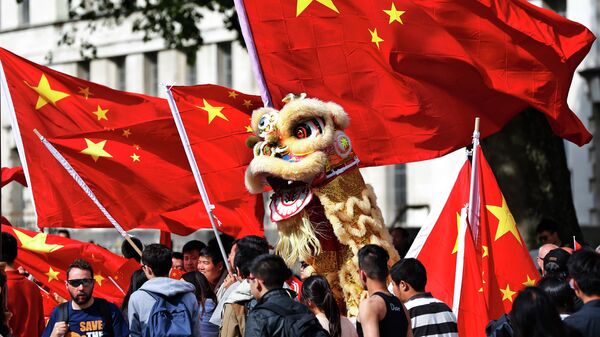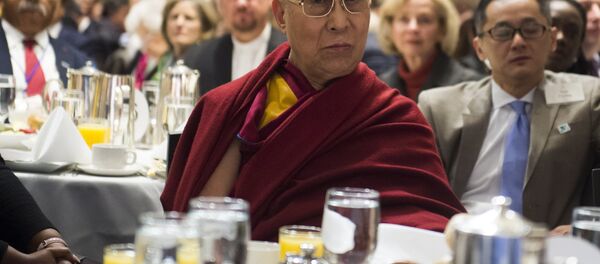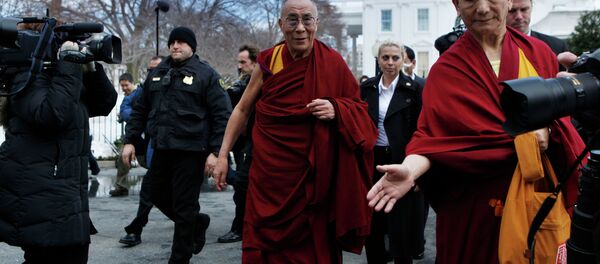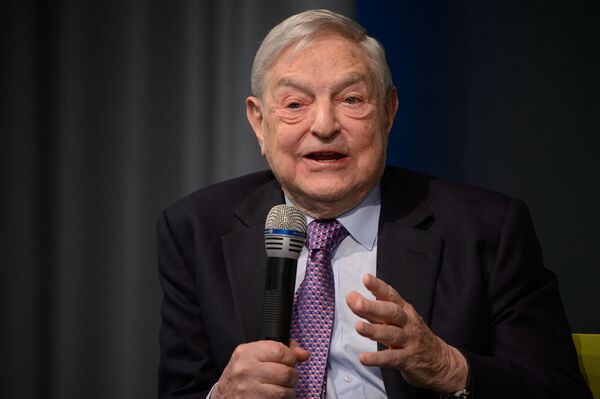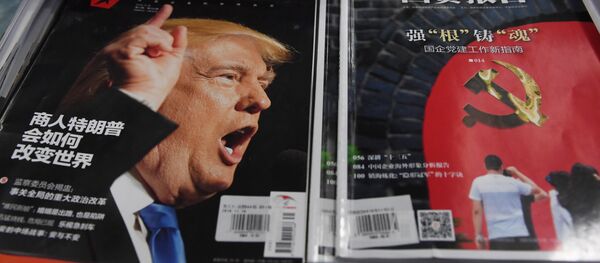The controversy over Donald Trump's "One China" remarks continues to simmer, prompting some observers to suggest that the US President-elect is testing the limits of Beijing's patience to reconsider the political basis of US-Chinese relations.
The rumor of the possibility of Trump's meeting with the Dalai Lama, the Tibetan spiritual leader, has added fuel to the fire.
In the eyes of Beijing both issues are closely associated with the general idea of China's sovereignty and territorial integrity.
As China's Ambassador to the US Cui Tiankai recently noted, in a veiled reference to Trump's remarks, "national sovereignty and territorial integrity are not bargaining chips."
Mainstream Media Warn Trump Against Playing Games With China
On the other hand, the mainstream media's reaction to the US President-elect's attempts to poke the Dragon deserves special attention, Tom McGregor, Commentator and Editor at China Network Television (CNTV) told Sputnik.
"The mainstream media appears to be outraged Trump would even consider meeting the Dalai Lama. But [US President Barack] Obama met the Dalai Lama on three occasions, Obama signed executive orders to deliver weapons to Taiwan at a value of billions of US dollars, Obama agreed with the United Nations Tribunal Court that ordered China to stop declaring certain waters of the South China Sea as part of its sovereign territory," McGregor recalled.
"But now, Trump has voiced some agreements with the Obama administration and the Western globalist elites are spewing outrage, demanding Trump stop siding with Obama and act more like a diplomat," McGregor stressed.
Indeed, on Thursday a Beijing-based correspondent of Time Magazine, Charlie Campbell, published an article entitled "Why Donald Trump really shouldn't play games with China over Taiwan."
"Beijing regularly cites the 'Taiwan question' as one of its 'core interests,' and the topic is toxic even among otherwise politically inert Chinese," Campbell underscored.
Likewise, Trump should avoid playing games with China over the Tibet issue, McGregor told Sputnik.
"For once, I agree with the globalist elites here. I would suggest, Trump avoid a 'Pivot to Pelosi.' US-Rep. Nancy Pelosi, (D.-Ca.) as I recall in 2008, showed up in Beijing and tried to unfurl a ‘Free Tibet' flag in a public square. She's the political leader of the ‘Free Tibet' movement in California. I do not wish to see Trump act in a Pelosi-like manner," the CNTV commentator said.
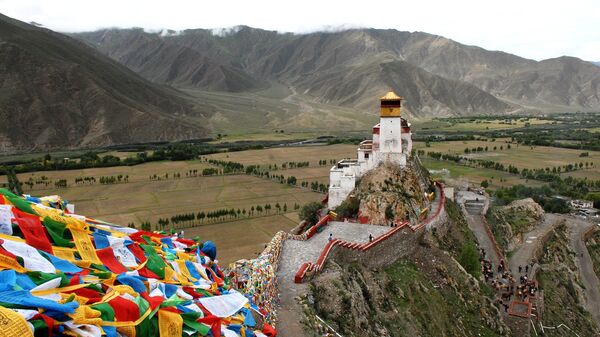
Washington Still Regards the Tibet Issue as an Ace Up Its Sleeve
CIA files declassified in 1998 indicated that the US had been inciting ethnic tensions and separatism in China's Tibet Autonomous Region (TAR) between 1956 and the early 1970s. Furthermore, during this period of time the CIA provided an annual subsidy of $180,000 to the 14th Dalai Lama.
"The Dalai Lama for many decades has been a beloved figure for the West. He's often interviewed on BBC News, where TV interviewers love to smile and ask him soft questions, such as, 'why are you so wonderful?'," McGregor remarked ironically.
"During and after China's Civil War, it made reasonable sense for Washington to support the Koumingtang over the Chinese Communist Party. The US supported democracy and free markets and sought allies who shared similar beliefs. Amid the Cold War, the CCP was diametrically opposed to such concepts, while Tibetan separatists leaned for support from Washington," McGregor emphasized.
Still, according to the journalist, "Nixon's visit to China in 1972 was an earth-shattering geo-political event that transformed global diplomacy."
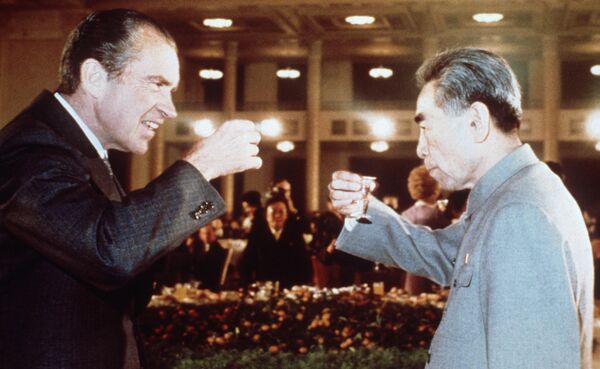
"China opened its doors to the West and after Mao's [Zedong] death, Beijing has embarked on free market reforms and opening up policy," he stressed.
US President Richard Nixon's visit to China in 1972 brought an end to the CIA Tibetan program. However, McGregor believes that the West still regards the Tibet issue as an ace up its sleeve.
"Bill Clinton was US president in 1998. How can we verify the Dalai Lama stopped receiving subsidies after the 1970s? Did Bill Clinton stop funding the Dalai Lama? If he stopped payments that would shock me, since the Democrat Party has close links to the 'Free Tibet' movement in San Francisco. Just look at US Rep. Nancy Pelosi (D.-Ca.) and her fervent support for the pro-Tibet crowd," he noted.
"Some groups continue to bolster Tibetan separatism, such as the Pelosi-led 'Free Tibet' movement, but in the US, such groups are perceived as far-Leftist hippie groups, best left ignored, unless you are looking to learn more about a good vegetarian diet, as well as to discover the joys of the Transcendental Movement TM and get yoga tips," McGregor added.
'Soros' Open Society Has Secret Office in Tsinghua University'
The journalist pointed out that there are obvious links between American billionaire George Soros and the Free Tibet movement.
"Soros is a major financier of ‘Democracy Now' activists, who organize anti-Beijing protests in Hong Kong and ‘Sunflower' movement in Taipei. Open Society has a secret office in Beijing's Tsinghua University that is operated by the Carnegie Center for Global Policy," McGregor revealed.
"Whenever Soros visits Beijing, he's a frequent guest speaker there," he pointed out.
'Trump Understands Negotiations Psychology Better Than Anyone'
Commenting on Trump's apparent attempts to shatter the established status quo, McGregor noted that "Trump will engage in trade wars with China, but not real wars."
"In the negotiation process, he is likely to criticize some of Beijing's political opinions as part of his strategy. It's a sort of boxing — to try to make your opponent get angry and emotional and he will waste energy throwing wild punches. When the opponent gets tired, you can sweep in for victory," the CNTV commentator said.
The journalist underscored that it seems that Trump understands negotiations psychology better than anyone else in the world and will seek compromise, "but only if China is willing to engage in give-and-take too."
"Trump is trying to figure out where to get Beijing to start showing some compromise. But I assure you that Trump does not want war against China and perhaps China knows that and sees is it as Beijing's biggest chip on the negotiation table," McGregor highlighted.
"Hence, Trump has to utilize an effective counter-punch maneuver, while maintaining world peace," he added.
The views expressed in this article are solely those of the author and do not necessarily reflect the official position of Sputnik.
Have you heard the news? Sign up to our Telegram channel and we'll keep you up to speed!
